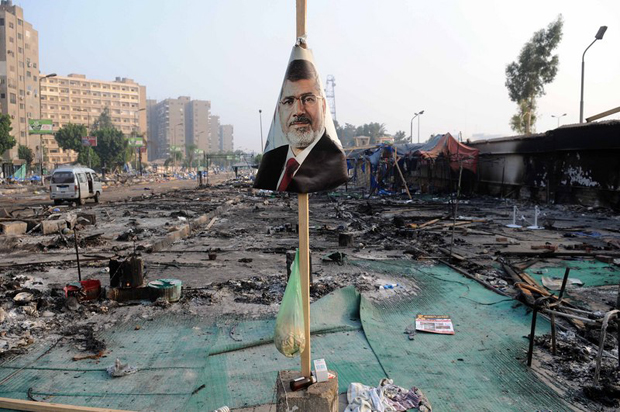
Egypt faced a new phase of uncertainty after the bloodiest day since its Arab Spring began, with nearly 300 people reported killed and thousands injured as police smashed two protest camps of supporters of the deposed Islamist president. (Photo: Nameer Galal / Demotix)
As the numbers steadily mount of those killed by the Egyptian military and police in yesterday’s attacks on Muslim Brotherhood camps, the prospects for Egypt’s ‘Arab spring’ are looking bleak.
The violent destruction of the two camps, and the indiscriminate shootings, beatings and arrests of supporters of ousted President Mohamed Morsi, and of journalists, was clearly planned. The country’s military rulers have taken little time to demonstrate their contempt for the many Egyptians who wrongly thought the army could usher in a more pluralist rights-respecting democracy. The hopes of those who saw July’s coup as somehow too positive to warrant such a label now lie in tatters, with Mohamed ElBaradei’s inevitable resignation just one small illustration of that.
Is this simply a return to square one – back to a Mubarak-style, military-run Egypt? At one level surely it is, with army head General al-Sisi showing neither shame nor compunction in such a murderous installation of the new state of emergency.
But while the similarities to the Mubarak era are clear, this is a new and different Egypt. The millions who demonstrated in Tahrir Square in 2011, and again this June in protest at President Morsi’s authoritarian approach to government, are not simply going to accede to corrupt and vicious military rule once more. And the brutal violence against the Muslim Brotherhood protesters is most likely to beget more violence rather than the destruction of the Brotherhood that the army appears intent on.
With the violent face of the new Egyptian regime now clearly on display to the whole world, with no respect for rights of protesters, or media, or ordinary citizens, the international response has been shamefully muted. The EU’s foreign policy supremo, Cathy Ashton, called for the military to exercise the “utmost restraint” and for an end to the state of emergency “as soon as possible, to allow the resumption of normal life”. Meanwhile Samantha Power, Obama’s UN ambassador, tweeted weakly that the “forcible removal” of protesters was “a major step backward”.
Earlier in the week, the US and EU failed in their mediation attempts to stop the attacks on the camps, that all could see were coming. The key question now should be whether they are prepared to go for tougher diplomacy in an attempt to exert some leverage on the disastrous social and political dynamics that have now been unleashed so far. This would have to revolve around suspension of the $1.3 billion of military aid the US gives Egypt each year.
Obama’s first statement of condemnation finally came today but with no hint of the sort of leadership or signal that suspension of aid would send. Obama’s cancellation of military exercises next month will not worry Egypt’s generals much. And his uplifting speech on a new beginning at Cairo University in 2009 – and his Nobel Prize that year – are surely now lost in the dust and ashes of the aftermath of Wednesday’s violence and the US’s refusal to use the tools of influence it has. For now, more urgent and serious statements are coming rather from the UN.
Whether Egypt’s citizens who demonstrated for an end to military rule, and for a genuine pluralist democracy can regroup enough to have the influence to stop the downward spiral looks doubtful. But the spirit of Tahrir Square did not die yesterday. And if Egypt is now in winter, then spring at some point must come again. But for now the winter looks to be just beginning.




